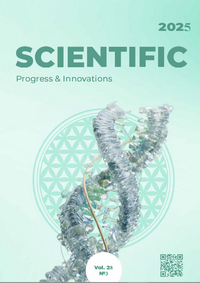Changes in the blood serum of dogs infested with different components’ mixed invasions
DOI:
https://doi.org/10.31210/spi2025.28.03.44Keywords:
parasitology, dogs, two-component, three-component mixed invasions, helminths, protozoa, biochemical indicatorsAbstract
The most widespread parasitic organisms that cause gastrointestinal disorders in dogs are mainly helminthes and protozoa, which became considerably spread throughout the world, including Ukraine. These pathogens cause diarrhea, vomiting, anorexia, and anemia in animals as a result of the development of intoxication and inflammatory processes, mainly in the gastrointestinal tract, and at some zoonotic helminthiases – in other organs. All these clinical changes are reflected in the changes in several blood parameters of infected animals.The aim of the research was to establish the peculiarities of the influence of endoparasites on the biochemical parameters of dogs’ blood serum in case of different component mixed invasions. The studies were conducted in the conditions of “Dovira” private veterinary clinic (Kharkiv). Four groups of animals were formed, one of which was the control (clinically healthy dogs) and three experimental ones (the first group was infected with trichurises, the second group was infected with trichurises and dipylidies, the third group was infected with trichurises, dipylidies and cystoisospores. It has been found by the conducted studies that with the increase in the number of co-members in the parasitocenosis, changes in the biochemical parameters of the blood serum of infested dogs become more significant, which indicates a more severe course of the disease. With trichurid mono-invasion, the biochemical parameters in the blood serum of infested dogs did not significantly differ from the similar parameters of clinically healthy animals. At trichurosis-dipilidiosis mixed invasion, infected animals showed a decrease in albumin content (by 8.24 %, 31.08 g/l) and glucose (by 14.15 %, 4.37 mcmol/l), as well as an increase in creatinine content (by 28.27 %, 118.59 с/l) and total bilirubin (by 21.0 %, 8.70 μmol/l). In the case of three-component mixed invasion (trichurosis-dipilidiosis-cystoisosporosis), more significant changes were found in the blood serum of infected dogs, which were characterized by a decrease in the content of total protein (by 6.05 %, 62.54 g/l), albumin (by 13.17 %, 29.41 g/l), glucose (by 23.77 %, 3.88 mmol/l), as well as an increase in the content of creatinine (by 40.31 %, 129.72 μmol/l), total bilirubin (by 40.06 %, 10.07 μmol/l). The obtained research results expand the existing data on individual elements of pathogenesis at multicomponent mixed invasions.
Downloads
Published
How to Cite
Issue
Section
License
Copyright (c) 2025 Scientific Progress & Innovations

This work is licensed under a Creative Commons Attribution 4.0 International License.

 Creative Commons Attribution 4.0 International Licens
Creative Commons Attribution 4.0 International Licens